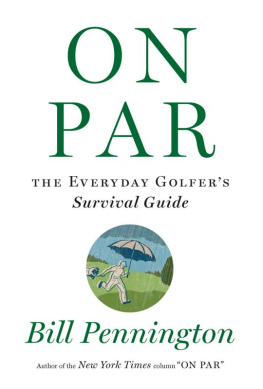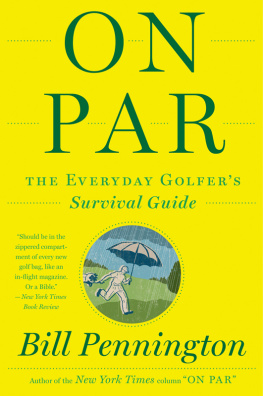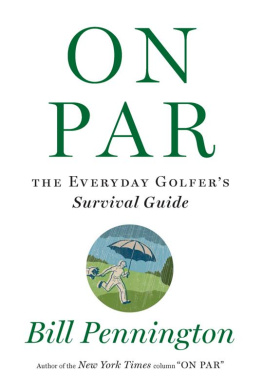Copyright 2012 by Bill Pennington
Illustrations 2012 by Bob Eckstein
All Rights Reserved
For information about permission to reproduce selections from this book, write to Permissions, Houghton Mifflin Harcourt Publishing Company, 215 Park Avenue South, New York, NY 10003.
www.hmhbooks.com
Library of Congress Cataloging-in-Publication Data
Pennington, Bill, date.
On par: the everyday golfers survival guide / Bill Pennington.
p. cm.
ISBN 978-0-547-54844-9 (hardback)
1. Golf. I.Title.
GV965.P418 2012
796.352dc23
2011052072
Book design by Brian Moore
Printed in the United States of America
DOC 10 9 8 7 6 5 4 3 2 1
Portions of this book first appeared in the New York Times in different form.
To Joyce, Anne D., Elise, and Jack
whatever the course, always the best partners
Introduction
They say golf is like life, but dont believe them.
Golf is more complicated than that.
GARDNER DICKINSON , longtime American tour pro
I BEGAN PLAYING golf seriously after college and was soon invited to an upscale private country club in Connecticut. As a former caddie, I knew how to dress the part and how to act, but my game was barely suitable for a dusty municipal course, let alone one of the more challenging layouts in the Northeast.
So, it was not a surprise that by the third hole I found myself in the deep rough a few feet behind a slender tree. I tried to chip out to the fairway but instead hammered my ball directly into the trunk of the tree before me. The ball ricocheted backward and struck me square in the forehead.
I hadnt hit the ball very hard, so I was mostly dazed by the impact. And, like many a beginner, I was frustrated. With an exasperated Thats unbelievable, I casually tossed the pitching wedge I was holding backward over my head. I didnt fling it; I just lofted it in the air.
The club lodged in the low-lying limbs of a pine tree about 10 feet off the ground.
Now, this was getting embarrassing.
Fortunately, my hosts at the clubnice people, but they were my elders and they certainly expected me to behavewere busy on the opposite side of the fairway looking for an errant shot in the woods. No one had seen my clown act. I was alone and unnoticed on my side of the hole.
I quickly grabbed another club from my bag, and since the tree branch with the pitching wedge was almost close enough to touch, I tossed the second club at the wedge, hoping to knock it free.
If you play golf, you know what happened next. The second club caught in the tree, too.
Now, with great haste, I drove my golf cart under the tree limb and stood on the back of the cart so I could shake the branch with one hand as I smacked it with a third club held in my other hand. It was at this moment that the cart with my gracious hosts pulled up beside me.
And there I was, well dressed and well mannered, except I was standing on a golf cart using both hands to extricate not one but two of my golf clubs that had somehow ended up suspended in a tree.
I turned and tried to smile.
Whats that big red welt on your forehead? one of my hosts asked.
I hit myself with my ball, I answered.
You might wonder how an early golf day like that could have led to the next two decades of (mostly) happy golfing. I admit, at that moment, its not what I would have predicted.
But then, I didnt expect my hosts to break out laughing. I didnt expect to laugh, too, trying to explain myself. And I did not expect them to then recount their own stories of golf misfortune, stories that might not have ended up with them shaking a tree for mislaid clubs but were nonetheless in the category of the things this game will make you do.
So it was at that moment, perhaps for the first time, that I felt like a golfer.
Does being a golfer mean enduring clumsy embarrassment? Well, yes, it does sometimes, but that wasnt the point. Being a golfer is to join a tribe with an elaborate set of tenets and canons, one with its own mores and protocols and no definable mission other than to chase a little ball into a hole.
It is a silly game, somewhat childish, a good walk spoiled, as Mark Twain said. It is all those things. So why do we love this game?
The allure of golf is its simplicity, which leads to a thousand complexities. It is sophisticated because it is subtle. It is perfect because it is wholly and forever imperfect.
I once asked David Duval, the 2001 British Open champion, what makes golf so difficult and yet so appealing. He said, Its all the time to think between shots.
I asked the great Phil Mickelson the same question and he said, Its all the choices you have.
I asked Jack Nicklaus and he replied, Because you must master so many elements, including yourself.
I asked the golf commentator and author David Feherty and he said, Because its a ridiculous game and its our fault for playing it.
I was tempted to ask Feherty if he had ever lost two clubs in a tree on one hole but realized it wasnt necessary. He would understand.
This is a book that speaks to both the exultant and troubled souls of golfers everywhere, men and women like me who are transfixed by the game and long to understand it. Golf is an endeavor of hope, fear, disappointment, glee, perseverance, abandonment, unrelenting gratification and unexpected reward, certain punishment, integrity, cheating, camaraderie, isolation, technology, and oneness with nature, all governed by a stifling set of ancient rules frequently undone by an unseen yet officially recognized karma called rub of the green.
We, the golf tribe, take our golf with eyes wide openthe better to let tears of frustration and of joy flow freely.
I have played golf seriously for the last thirty years and have covered and written about the game throughout that time as well. For the last several years, I have written a weekly golf column in The New York Times called On Par, which has let me come face-to-face with all the simplicities and complexities of golf in its many arenas. But newspaper columns are brief. A book allows us to examine golfs length and breadth, to propose and ponder solutions to the seemingly unsolvable. Because golf is much more than the quest to master the actual game. Golf transports the player to a foreign land and culture with its own set of mores and protocols. It is a world with quizzical and ever-changing weaponry and settings of great beauty but treacherous hazards.
Golf is often likened to a battle of self, a crucible of temptation and honor, and it is, but even that seems an understatement since golf means learning to deal with maddening playing partners, changing weather conditions, astonishing inequities, and ugly clothes, not the least of which is hopelessly goofy shoes.
Then there are the basic steps of learning the game and the behemoth of golf instruction. Everything about this helpful community of teachers is inherently confusing, which might explain why there are several hundred theories on the correct way to learn golf and another thousand theories on how to get better at it. The reality is that the golfing indoctrination never truly ends. The game even has its own ever-evolving language.
And yet, there is no more dedicated tribe than golfers. If they are not exactly the definition of contentment, they are hearty and resolute. If love means never having to say youre sorry, then golf means never having to say youre satisfied.
Why do golfers say that it never rains on the golf course? Because even when it does, there is nowhere else they would rather be. Why do few serious golfers quit the game? Because they are convinced they are one keen golf tip, or one discerning golf book, away from learning the secret to good golf for good. Why do presidents of the United States play golf? Because it makes running the free world seem easy.
Next page







